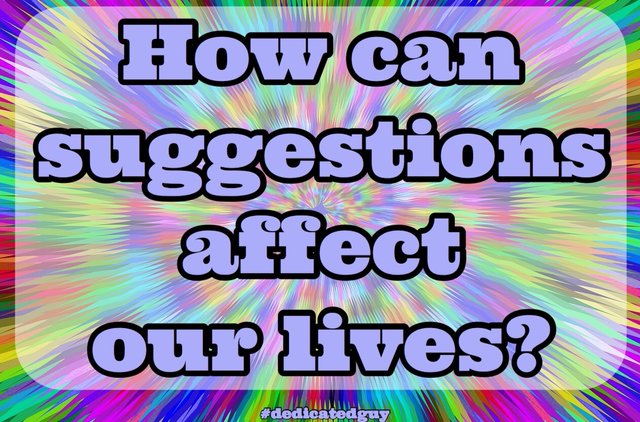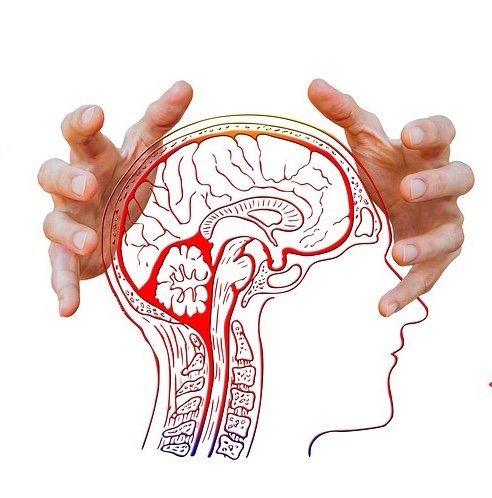How can suggestions affect our lives?

Due to certain television shows, the concept of suggestion have been greatly damaged, have lost credibility and is perceived as a kind of spell by which a supposedly “hypnotist” can get another person to do anything. Whether it is to become a prodigy of music or doing something ridiculous.
But nothing is further from the truth, the concept suggestion is a psychological process and that when carried out by qualified health professionals, can be of great help in certain behavioral treatments.

What are suggestions all about?
Suggestion, in psychology, process of leading a person to respond uncritically, as in belief or action. The mode of suggestion, while usually verbal, may be visual or may involve any other sense. The suggestion may be symbolic. | Source
Suggestion is what allows the mental manipulation of other people through a series of techniques involving other people, media or all kinds of tools such as music or books, since everyone of them have the ability to guide or drive certain ideas, emotions or behaviors in people.

Although this concept is traditionally associated with hypnosis, suggestions can be effective and are commonly used in other settings in which the person is out of a hypnotic state. For example, advertising and marketing teams with large funding have always been accused of manipulating people’s behavior to achieve their own ends and benefits.
Suggestions can have enormous influence over our behavior, as well as in the way we perceive reality. But for this is equally important both the ability of a person or tool to exercise the suggestion, and how much susceptible is the individual receiving said suggestion.
This means that a highly suggestible person is susceptible to being manipulated without said person being aware of it. In these cases it is very likely that this person is carried away by what is transmitted in the media, and advertisements or by what other people say.

Suggestions and hypnosis
Suggestion, as already mentioned, has traditionally been associated with hypnosis practices. And although they are closely related there are some factors that differentiate them.
What is hypnosis?
Hypnosis is a therapeutic technique in which clinicians make suggestions to individuals who have undergone a procedure designed to relax them and focus their minds. | Source
… it's a technique for putting someone (or yourself) into a state of concentration where you are more suggestible and thus more open to messages about breaking bad habits or changing in other positive ways. | Source

By hypnosis we can understand the complete process through which the person is immersed in a mental state of trance or altered consciousness, while the suggestion would be the concrete act of transmitting a certain message or information to the person.
However, hypnosis can be considered as a real state of trance or as the alteration of the behavior explained through motivational and mental factors such as the attitude or expectations of the person. Although, this technique has obviously always been questioned, there will always be some people offering it as some kind of therapy.
The main reason that explains why this procedure is doubted is that it has been represented as an almost magical practice in which a person, more like a wizard or sorcerer than a professional, exercised a series of ‘spells’ to the other person that end up causing this person to behave eccentrically or strangely. Nevertheless, if the suggestion is applied in a responsible and serious manner, they can be considerably effective in helping solving the issue at hand, like for example the need to stop drinking and some behavioral addictions, physical pain handling, sleep disorders, weight loss processes, among others.
Using suggestion in this way can be a powerful tool in accomplishing our goals. But many of us get caught up on the other side, thinking only of our limitations. | Source

Are all suggestions the same?
There is an extensive classification of the types of suggestion, which are distinguished according to many factors. Below I will share the most common ones:
Deliberate Source: In this type of suggestion, the person is directly indicated what they are intended to experience. For example: "notice how your eyelids become more and more heavy."
Unintentional Source: in this case the goal is to obtain a response without the conscious consent of the person. They are especially useful in people who are skeptical or suspicious about these things.

- Hypnotic Source: When referring to hypnotic suggestions, those are the ones that consists with the professional beginning the therapy, and ends along with the the hypnotic state. I mean, the individual will just have the effects of the hypnosis for the duration of the session.
- Non-hypnotic Source: this suggestions are given or shared during the session, but are experienced by the person once this is over. The intent is that the person modify their behavior or their way thinking about daily life at all times.
Through suggestive techniques, the ability of a person to perceive a specific stimulus can be altered, as well as provoking a kind of hallucinations involving visual or auditory perceptions.
However, it is necessary to clear up that these hallucinations have no relation whatsoever with what some people provoke or achieve in the traditional hypnosis shows, as well as the hallucinations experienced with certain psychiatric disorders.
Another thing the can be accomplish thanks to this is to cause certain movements as well as the avoid them, like for example getting a person to move any of their joints or, on the other hand, submerge the person in a state of paralysis or catalepsy.

Conclusion

Our mind, with all its complexities can be easily manipulated by people with the necessary knowledge and skills.
All people exert some influence on others. Some have an easier time because they are naturally good speakers, so being persuasive becomes easier, and can convince with their arguments even if the other person thinks otherwise.
I have an uncle that works selling certain products for laboratories, and he even received a training about certain psychological tricks to make the client more susceptible to the offered products, things like the color of the tie can have considerable influence when its time to convince clients about the convenience of buying their products, which are probably adapted to the needs of each one so they can be considered very essential.
Having said all this, chances are, everyone of us are receiving suggestion from different sources permanently, each one trying to determine how we are going to behave and what decisions are we going to take. So we better keep an eye out folks!
Have you ever felt someone was trying to control your behavior without you noticing it?
Or perhaps you were the one trying to control another person while dissimulating it?
References
psychologytoday – power of suggestion
Images sources
All images are from pixabay

If these titles sound interesting to you, I assure you the articles will be even better!

Beware of the Burnout syndrome
Understanding our brain, how our thoughts work
Procrastination and psychology
Why are some people hypocrites?
Why some people are always late to everything?
thanks for the information, very useful
I am glad you found it informative and useful!
I think the greatest ally we have against being a victim of suggestion is awareness. It allows us to pick up on any nefarious stuff and allow the good stuff.
Yes, although in some occasions suggestions can help in overcoming certain issues.
This is quite alarming. If a person let's other people control his/her thought by being too susceptible to suggestions then he/she might be having problems with fully controlling one's life. It could also result to anxiety,lack of self-esteem and inferiority. Social media as what you have said is a great factor in this whole psychological mess. Since people are easily influenced by social media norms. Great article as always @dedicatedguy. Glad I passed by... 🌸
I feel like I learned so much from this! Thank you! :)
I am glad you found this useful!
In about 12 hours I will share a post about deliriums!
Cheers!